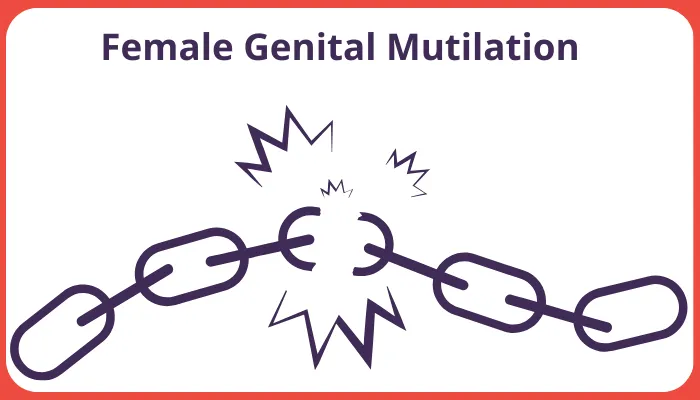Every child's well-being matters.
Types of Abuse Articles
Quick Access
Abuse of Authority
Abuse of Discretion
Abuse of Power
Behavioural Indications
Breast Ironing
County Lines
Cultural Differences (Physical Abuse)
Domestic Abuse
Economic Abuse
Emotional Signs
Exposure to Substance Abuse
Failure to Thrive
Female Genital Mutilation (FGM)
Forced Marriage
Hate Crimes & Targeted Harassment
Impact of Domestic Violence
Impact of Environment
Impact on Development
Institutional Abuse
Isolation
Modern Slavery
Neglect
Online Abuse
Parental Behaviours
Physical Abuse
Radicalisation
Religious Abuse
Restraint
Sexual Abuse
Types of Abuse
Witnessing Domestic Abuse

Female Genital Mutilation (FGM)
Custom HTML/CSS/JAVASCRIPT
Female Genital Mutilation (FGM) involves the partial or total removal of external female genitalia or other injury to the female genital organs for non-medical reasons.
It is a deeply rooted cultural practice in some regions of the world and carries significant health risks and human rights implications. It is illegal in the UK.
Recognising the signs of FGM is crucial for providing the necessary support and care to affected individuals. The signs of FGM can be categorised into physical, psychological, and behavioural indicators, each with its immediate and long-term manifestations.
However, the best intervention is prevention, so we’ll start with how to spot when FGM might be about to occur on a child in your care.
Pay attention when a child’s family talks about planning a long and/or special trip. Small children might use words like ‘ceremony’ ‘growing up’ or say ‘to be like mummy when I come back.’
This is particularly important when you know the child is from a community with roots in a country where FGM is prevalent. Here is a known (non-exclusive) list of those communities most at risk:
Kenyan, Nigerian, Eritrean, Egyptian, Sierra Leonean, Sudanese, Somalian, Afghan, Pakistani, Indonesian, Yemeni, Kurdistan, Malaysian, Turkish, Thai (south).
Is the special trip to one of these countries? Does it have an indeterminate end date? Answering yes to these questions alongside what you have heard the child talking about means you need to take action. You could prevent a child from harmed in this way.
Here are the signs that FGM might have already occurred in a child in your care:
Physical signs of FGM can be particularly severe and are often the most apparent.
Immediately after the procedure, affected individuals may experience severe pain and bleeding, as well as swelling of the genital area. Urinary problems, such as painful urination or urinary retention, are also common due to the trauma inflicted on the genital organs. Difficulty walking or sitting can be an indicator of recent FGM, as the pain and injury from the procedure make basic movements challenging.
In the months after a child undergoes the procedure, you may notice the following physical signs:
- Chronic genital pain
- Recurrent urinary tract infections
- The formation of cysts, abscesses, and scar tissue
Psychological and emotional signs of FGM are profound and can last a lifetime.
Immediately following the procedure, many girls experience shock, anxiety, and depression. The trauma of FGM can lead to post-traumatic stress disorder (PTSD), characterised by flashbacks, nightmares, and severe anxiety.
These psychological effects can persist long after the physical wounds have healed.
Long-term emotional and psychological effects include chronic stress and depression, often exacerbated by the stigmatisation and isolation that survivors may feel within their communities. Low self-esteem and body image issues are also common, as the experience of FGM can profoundly affect how individuals perceive themselves.
In young children, certain behavioural changes can signal that they may have undergone FGM.
These signs might include a sudden fear or avoidance of being touched or examined, especially during routine medical check-ups or during changes. Children might also exhibit discomfort or distress when going to the bathroom or show signs of pain that seem unusual for their age.
Changes in a child's behaviour can be another indicator. A child who was once cheerful and active might become withdrawn, anxious, or less willing to participate in play or activities they previously enjoyed. In some cases, a child might show a reluctance to sit down or express fear of physical activities that involve movement. Frequent absences from nursery or school, could be a red flag that the child may be a victim of FGM.
Practicsing awareness
For practitioners working with young children, it is essential to be both vigilant and sensitive when identifying potential signs of FGM. Creating a safe, supportive, and non-judgmental environment is crucial for children to feel secure. If FGM is suspected, providing immediate care and psychological support is vital to address the physical and emotional impact on the child.
Recognising the signs early on is key to intervening in this harmful practice and ensuring the health and well-being of all young girls. You can prevent this from happening.
AUTHOR:- Iona has nearly 10 years of experience supporting nurseries and childminders in curriculum planning, leadership, and safeguarding. Her writing is informed by public information and sector insight, aiming to provide accessible, practical support for professionals working with children. She is part of the On the Button team, helping deliver Well-being, Safeguarding and Complaint Management Software that empowers practitioners to identify concerns early and act confidently.
On the Button provides innovative software tailored to the needs of the early years sector, with a strong focus on EYFS well-being and early years safeguarding. Our tools help senior practitioners to confidently track concerns, maintain robust records, and respond effectively — all while meeting statutory guidance. From early years complaint management to team-wide safeguarding alerts, our platform puts children's safety and emotional health first.
Quick Access
Abuse of Authority
Abuse of Discretion
Abuse of Power
Behavioural Indications
Breast Ironing
County Lines
Cultural Differences (Physical Abuse)
Domestic Abuse
Economic Abuse
Emotional Signs
Exposure to Substance Abuse
Failure to Thrive
Female Genital Mutilation (FGM)
Forced Marriage
Hate Crimes & Targeted Harassment
Impact of Domestic Violence
Impact of Environment
Impact on Development
Institutional Abuse
Isolation
Modern Slavery
Neglect
Online Abuse
Parental Behaviours
Physical Abuse
Radicalisation
Religious Abuse
Restraint
Sexual Abuse
Types of Abuse
Witnessing Domestic Abuse

Female Genital Mutilation (FGM)
Custom HTML/CSS/JAVASCRIPT
Female Genital Mutilation (FGM) involves the partial or total removal of external female genitalia or other injury to the female genital organs for non-medical reasons.
It is a deeply rooted cultural practice in some regions of the world and carries significant health risks and human rights implications. It is illegal in the UK.
Recognising the signs of FGM is crucial for providing the necessary support and care to affected individuals. The signs of FGM can be categorised into physical, psychological, and behavioural indicators, each with its immediate and long-term manifestations.
However, the best intervention is prevention, so we’ll start with how to spot when FGM might be about to occur on a child in your care.
Pay attention when a child’s family talks about planning a long and/or special trip. Small children might use words like ‘ceremony’ ‘growing up’ or say ‘to be like mummy when I come back.’
This is particularly important when you know the child is from a community with roots in a country where FGM is prevalent. Here is a known (non-exclusive) list of those communities most at risk:
Kenyan, Nigerian, Eritrean, Egyptian, Sierra Leonean, Sudanese, Somalian, Afghan, Pakistani, Indonesian, Yemeni, Kurdistan, Malaysian, Turkish, Thai (south).
Is the special trip to one of these countries? Does it have an indeterminate end date? Answering yes to these questions alongside what you have heard the child talking about means you need to take action. You could prevent a child from harmed in this way.
Here are the signs that FGM might have already occurred in a child in your care:
Physical signs of FGM can be particularly severe and are often the most apparent.
Immediately after the procedure, affected individuals may experience severe pain and bleeding, as well as swelling of the genital area. Urinary problems, such as painful urination or urinary retention, are also common due to the trauma inflicted on the genital organs. Difficulty walking or sitting can be an indicator of recent FGM, as the pain and injury from the procedure make basic movements challenging.
In the months after a child undergoes the procedure, you may notice the following physical signs:
- Chronic genital pain
- Recurrent urinary tract infections
- The formation of cysts, abscesses, and scar tissue
Psychological and emotional signs of FGM are profound and can last a lifetime.
Immediately following the procedure, many girls experience shock, anxiety, and depression. The trauma of FGM can lead to post-traumatic stress disorder (PTSD), characterised by flashbacks, nightmares, and severe anxiety.
These psychological effects can persist long after the physical wounds have healed.
Long-term emotional and psychological effects include chronic stress and depression, often exacerbated by the stigmatisation and isolation that survivors may feel within their communities. Low self-esteem and body image issues are also common, as the experience of FGM can profoundly affect how individuals perceive themselves.
In young children, certain behavioural changes can signal that they may have undergone FGM.
These signs might include a sudden fear or avoidance of being touched or examined, especially during routine medical check-ups or during changes. Children might also exhibit discomfort or distress when going to the bathroom or show signs of pain that seem unusual for their age.
Changes in a child's behaviour can be another indicator. A child who was once cheerful and active might become withdrawn, anxious, or less willing to participate in play or activities they previously enjoyed. In some cases, a child might show a reluctance to sit down or express fear of physical activities that involve movement. Frequent absences from nursery or school, could be a red flag that the child may be a victim of FGM.
Practicsing awareness
For practitioners working with young children, it is essential to be both vigilant and sensitive when identifying potential signs of FGM. Creating a safe, supportive, and non-judgmental environment is crucial for children to feel secure. If FGM is suspected, providing immediate care and psychological support is vital to address the physical and emotional impact on the child.
Recognising the signs early on is key to intervening in this harmful practice and ensuring the health and well-being of all young girls. You can prevent this from happening.
AUTHOR:- Iona has nearly 10 years of experience supporting nurseries and childminders in curriculum planning, leadership, and safeguarding. Her writing is informed by public information and sector insight, aiming to provide accessible, practical support for professionals working with children. She is part of the On the Button team, helping deliver Well-being, Safeguarding and Complaint Management Software that empowers practitioners to identify concerns early and act confidently.
On the Button provides innovative software tailored to the needs of the early years sector, with a strong focus on EYFS well-being and early years safeguarding. Our tools help senior practitioners to confidently track concerns, maintain robust records, and respond effectively — all while meeting statutory guidance. From early years complaint management to team-wide safeguarding alerts, our platform puts children's safety and emotional health first.

Female Genital Mutilation (FGM)
Custom HTML/CSS/JAVASCRIPT
Female Genital Mutilation (FGM) involves the partial or total removal of external female genitalia or other injury to the female genital organs for non-medical reasons.
It is a deeply rooted cultural practice in some regions of the world and carries significant health risks and human rights implications. It is illegal in the UK.
Recognising the signs of FGM is crucial for providing the necessary support and care to affected individuals. The signs of FGM can be categorised into physical, psychological, and behavioural indicators, each with its immediate and long-term manifestations.
However, the best intervention is prevention, so we’ll start with how to spot when FGM might be about to occur on a child in your care.
Pay attention when a child’s family talks about planning a long and/or special trip. Small children might use words like ‘ceremony’ ‘growing up’ or say ‘to be like mummy when I come back.’
This is particularly important when you know the child is from a community with roots in a country where FGM is prevalent. Here is a known (non-exclusive) list of those communities most at risk:
Kenyan, Nigerian, Eritrean, Egyptian, Sierra Leonean, Sudanese, Somalian, Afghan, Pakistani, Indonesian, Yemeni, Kurdistan, Malaysian, Turkish, Thai (south).
Is the special trip to one of these countries? Does it have an indeterminate end date? Answering yes to these questions alongside what you have heard the child talking about means you need to take action. You could prevent a child from harmed in this way.
Here are the signs that FGM might have already occurred in a child in your care:
Physical signs of FGM can be particularly severe and are often the most apparent.
Immediately after the procedure, affected individuals may experience severe pain and bleeding, as well as swelling of the genital area. Urinary problems, such as painful urination or urinary retention, are also common due to the trauma inflicted on the genital organs. Difficulty walking or sitting can be an indicator of recent FGM, as the pain and injury from the procedure make basic movements challenging.
In the months after a child undergoes the procedure, you may notice the following physical signs:
- Chronic genital pain
- Recurrent urinary tract infections
- The formation of cysts, abscesses, and scar tissue
Psychological and emotional signs of FGM are profound and can last a lifetime.
Immediately following the procedure, many girls experience shock, anxiety, and depression. The trauma of FGM can lead to post-traumatic stress disorder (PTSD), characterised by flashbacks, nightmares, and severe anxiety.
These psychological effects can persist long after the physical wounds have healed.
Long-term emotional and psychological effects include chronic stress and depression, often exacerbated by the stigmatisation and isolation that survivors may feel within their communities. Low self-esteem and body image issues are also common, as the experience of FGM can profoundly affect how individuals perceive themselves.
In young children, certain behavioural changes can signal that they may have undergone FGM.
These signs might include a sudden fear or avoidance of being touched or examined, especially during routine medical check-ups or during changes. Children might also exhibit discomfort or distress when going to the bathroom or show signs of pain that seem unusual for their age.
Changes in a child's behaviour can be another indicator. A child who was once cheerful and active might become withdrawn, anxious, or less willing to participate in play or activities they previously enjoyed. In some cases, a child might show a reluctance to sit down or express fear of physical activities that involve movement. Frequent absences from nursery or school, could be a red flag that the child may be a victim of FGM.
Practicsing awareness
For practitioners working with young children, it is essential to be both vigilant and sensitive when identifying potential signs of FGM. Creating a safe, supportive, and non-judgmental environment is crucial for children to feel secure. If FGM is suspected, providing immediate care and psychological support is vital to address the physical and emotional impact on the child.
Recognising the signs early on is key to intervening in this harmful practice and ensuring the health and well-being of all young girls. You can prevent this from happening.
AUTHOR:- Iona has nearly 10 years of experience supporting nurseries and childminders in curriculum planning, leadership, and safeguarding. Her writing is informed by public information and sector insight, aiming to provide accessible, practical support for professionals working with children. She is part of the On the Button team, helping deliver Well-being, Safeguarding and Complaint Management Software that empowers practitioners to identify concerns early and act confidently.
On the Button provides innovative software tailored to the needs of the early years sector, with a strong focus on EYFS well-being and early years safeguarding. Our tools help senior practitioners to confidently track concerns, maintain robust records, and respond effectively — all while meeting statutory guidance. From early years complaint management to team-wide safeguarding alerts, our platform puts children's safety and emotional health first.
Quality Early Years Ltd.,
Dickens House,
Guithavon Street,
Witham, Essex,
England, CM8 1BJ
© Quality Early Years Ltd 2025

Find On the Button
on Social Media

